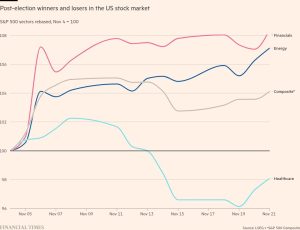Kamala Harris’s Wall Street charm offensive begins to pay off
Wall Street is warming to US presidential candidate Kamala Harris after weeks of behind-the-scenes courting between donors and her campaign, even as some executives still lean towards Donald Trump and his plans for deep tax cuts.
Leading Democratic donors and bundlers, including Blackstone’s Jon Gray, Centerview’s Blair Effron and Lazard’s Ray McGuire, have been fostering ties in recent weeks between financiers and the vice-president as she seeks to reassure executives that she would be a moderate in office after what many on Wall Street considered President Joe Biden’s hostility to business.
“Vice-president Harris believes that a strong business environment is the engine that drives economic growth and opportunity,” said Brad Karp, chair of corporate law firm Paul Weiss. “She believes in sensible regulation, [and] predictable and transparent rules of the road.”
Her outreach was visible on Wall Street in August when her campaign gave a prominent podium slot at the Democratic convention to Ken Chenault, formerly American Express CEO and now chair of private equity group General Catalyst.
“I was going to vote for Trump because I was annoyed about being targeted by Biden . . . I could reconsider now,” said one leading private equity investor. “Trump is still better on taxes but Harris seems to be more like Clinton than Obama or Biden.”

As part of the charm offensive, she has hosted corporate chief executives, including Karen Lynch of CVS, Ryan McInerney of Visa, Charles Phillips of Infor and Greg Brown of Motorola, at her Washington residence.
The Democratic candidate’s efforts to burnish her pro-business credentials and build relationships comes as she tries to sustain a fundraising lead over Trump, who has sought to depict her as a radical threat to US capitalism.
The overtures have persuaded some moderates on Wall Street who were toying with supporting Trump to revise their stance, according to interviews with executives and supporters of the vice-president.
“Kamala is piecing it together . . . A lot of people will support Harris even though they’re worried about the economy — and so they should be,” said one veteran banker. “Economically most people are comfortable with Trump but you’ll see a spread of votes because there’s a lot of risk embedded with Trump.”
Two finance executives close to Harris said they had been reassured by her that she could appoint new officials to the Securities and Exchange Commission and the Federal Trade Commission who would take a less aggressive stance than current chairs Gary Gensler and Lina Khan, respectively.
A campaign official disputed that characterisation and noted that when the vice-president discussed antitrust issues, she only talked about policy and not personnel.
Harris’s outreach effort and polling that puts her marginally ahead of Trump nationally but in a tight race in the swing states has also energised Wall Street Democrats and independents who had expected Trump to defeat Biden in November’s election.
“People had been staying out, giving to congressional campaigns and preparing for the worst . . . they are now engaged,” said Daniella Ballou-Aares, founder of the Leadership Now Project, which last month mustered a group of more than 70 senior business leaders to endorse her.
“Her whole line on ‘I’m a capitalist and we need to recognise the good actors’ is the right direction. This is an administration with some potential for engagement,” Ballou-Aares added.
Harris last week described herself as both a “strong supporter of workers and unions” and a “capitalist” who believed in “free and fair markets” and a partnership between government and the private sector.

Her courting of business leaders has also helped keep some high-profile Republican donors on the sidelines, said some executives.
Citadel founder Ken Griffin, who backed Republican Nikki Haley’s bid for the White House earlier this year, has not endorsed Trump and is now focused on supporting candidates for Congress.
JPMorgan Chase chief executive Jamie Dimon made waves earlier this year with his positive comments about Trump, but he recently declined to endorse either candidate.
Harris’s overtures to the finance world have not persuaded some on Wall Street, however, who note that she was a key player in the Biden administration and pushed progressive positions when she first ran for president in 2020.
“The question with Harris is whether she is the very progressive senator that we knew or is she this new ‘I love capitalism’ centre-left that has emerged over the past few weeks,” said the chief executive of a large US asset manager. “Even if you believe that she’s reasonable left of centre, will she be able to govern there?”
Others say that while they are concerned about Trump’s unpredictability, they prefer his position on tax and financial issues. The former president slashed taxes on corporations and the wealthy in 2017 and has vowed to cut the corporate tax rate from 21 per cent to 15 per cent if he is re-elected. Harris has promised to increase the rate.
“When he was president, we had a booming economy before it was hit by Covid, low levels of inflation and peace around the world . . . He made a commitment to cut 10 regulations for each new one,” said hedge fund manager John Paulson, a contender for Treasury secretary if Trump wins.
Another hedge fund executive said Trump was now “much more acceptable than he was four or eight years ago”.
He estimated 80 per cent of top Wall Street executives had backed Hillary Clinton over Trump in 2016, but said Harris had support from about 55 per cent.
Another New York-based hedge fund manager said he was “reluctantly” voting for Trump because he had been “right” on issues such as immigration and Iran. “It’s a horrible choice, but if you want to vote then you have to make a choice,” he said.
Additional reporting by Antoine Gara, Joshua Franklin and Alex Rogers
US Election Countdown
Sign up to our US Election Countdown newsletter, your essential guide to the twists and turns of the 2024 presidential election
#Kamala #Harriss #Wall #Street #charm #offensive #begins #pay



